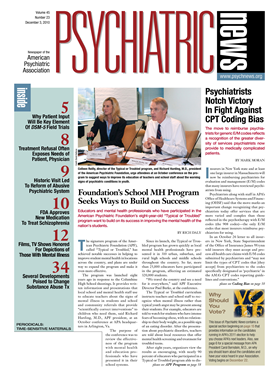Emotional impulsiveness has great predictive value in attention-deficit/hyperactivity disorder (ADHD) and thus should be returned to the DSM-5 definition of the disorder, said Russell Barkley, Ph.D., at the annual meeting of the American Academy of Child and Adolescent Psychiatry in New York in October.
The inability to regulate emotions was included in George Still's original 1902 description of what is now called ADHD, but the DSM-II, published in 1968, failed to include deficient emotional self-regulation, and it has remained only an “associated feature” of the definition since that time, said Barkley, a clinical professor of psychiatry at the Medical University of South Carolina.
“The current DSM-IV definition also misses a substantial minority of adults who by other definitions might be considered to have the disorder,” said Barkley.
Proposed criteria under discussion for DSM-5 include only one element reflecting emotional impulsiveness, according to Barkley.
“The only item is the new one, which is ‘often impatient,’” he said. “Otherwise, emotion is unrepresented so far in the proposed changes.”
The DSM-IV standard was never designed for adults or tested on them, he said. “If we apply DSM-IV criteria to adults, we find that only 25 percent of these children continued to meet these criteria. Or do we shift to appropriate developmental criteria, needing only four symptoms instead of six, and insisting that you be at the 98th percentile in the adult population in severity and impaired in one or more life activities.”
In that case, he said, 66 percent of these children met that criterion by follow-up at age 27.
Emotional impulsiveness contributed “uniquely and independently” to a number of outcomes, from school and work histories to marital and driving problems, in a study of Milwaukee children followed from early adolescence to age 27, he said. That work is reinforced by other studies showing that such impulsiveness drives away friends, spouses, and coworkers, he said. A boss can forgive distractibility but not displays of anger in the workplace.
Much comorbid oppositional-defiant disorder (ODD) can be explained by emotional impulsiveness, he said. In fact, when ADHD is treated successfully, ODD symptoms usually decline as well. Any residual ODD should be considered learned behavior and treated with appropriate therapy, Barkley said.
There is some overlap with the inhibitory component of ADHD, but Barkley would like to see emotional symptoms added in place of some hyperactivity symptoms to represent the emotional element in ADHD.
“Emotion needs to be returned to our current conceptualization of this disorder. It has just as great a role to play as inattentive and hyperactive behavior and will contribute variants and unique explanatory power to understanding these impairments across the life course,” he said.


